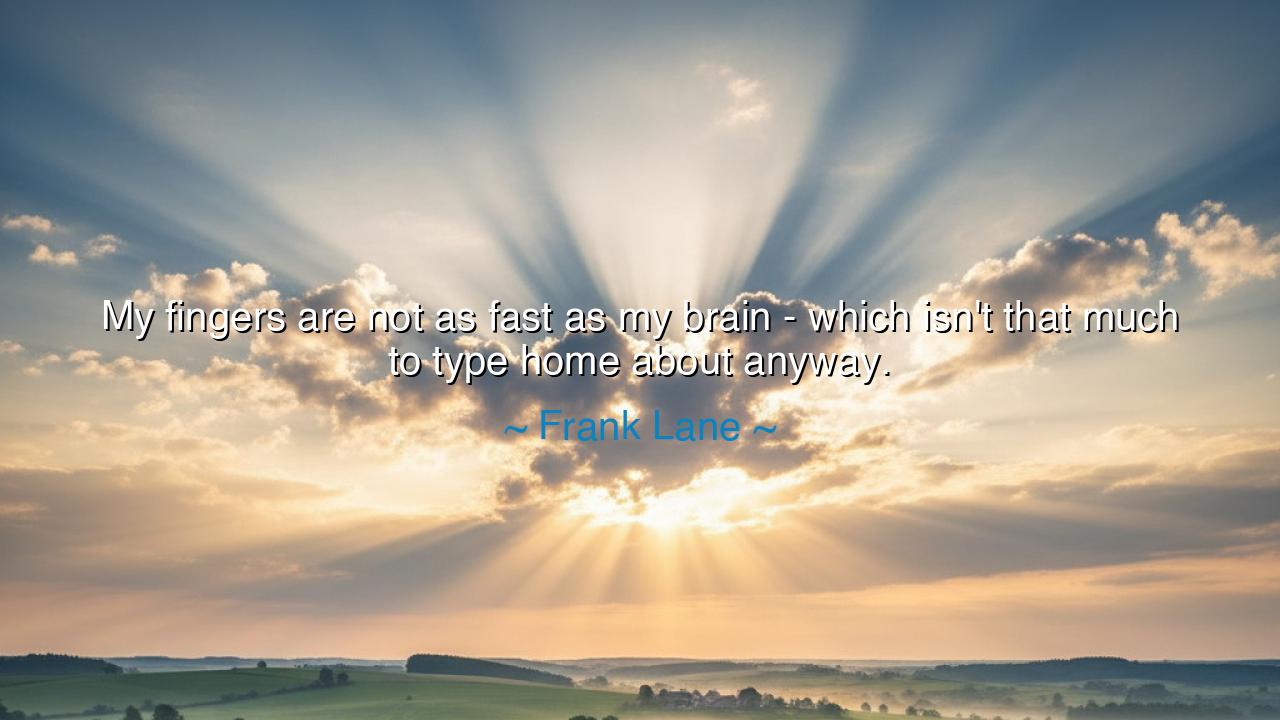
My fingers are not as fast as my brain - which isn't that much to
My fingers are not as fast as my brain - which isn't that much to type home about anyway.






In the wry confession of Frank Lane—“My fingers are not as fast as my brain—which isn’t that much to type home about anyway”—we hear humor used like a tuning fork, setting truth vibrating without bitterness. The line admits two things at once: the mind races ahead, the hands lag behind; and even the racing mind is mortal, mixed, ordinary. It is a double bow—one to human limitation, one to human scale. By laughing at himself, he frees us to look honestly at our own mismatched gears.
The ancients knew this gap between thought and action. Philosophers spoke of the will’s stumble—how intention shines like dawn while practice lurches like an ox. Scribes bent over wax tablets, struggling to catch an orator’s torrent; generals drafted perfect strategies that mud and weather undid. Lane’s jest carries their wisdom forward: the instrument we play (our fingers, our tools, our time) rarely keeps pace with the melody rushing through the brain. The art is not to curse the tempo, but to learn the cadence by which real work is done.
Mark also the mercy tucked into “not that much to type home about.” This is humility as armor. The one who does not boast cannot be broken by failure; the one who remembers his ordinary stature can endure the ordinary slowness of craft. Such self-deprecation is not self-contempt; it is ballast. It keeps the ship steady when the sea of expectation rises. In admitting that our brilliance is partial, we make room for patience and for other people.
Consider a small tale. A young scholar, brilliant in conception, wrote sentences that tangled like vines. His ideas outpaced his pen, and his pages groaned with crossings-out. An elder advised him to dictate to a friend at walking speed—“Let your mouth and breath govern what your fingers cannot.” He obeyed, and the prose cleared. The brain kept its fire; the body found a rhythm. In time he learned to honor his own rate of making instead of worshiping the imagined sprint of others.
History repeats the lesson like a refrain. Great builders sketched cathedrals with swift charcoal, then spent decades laying stone. Composers heard symphonies whole, then copied parts by lamplight for each bowed hand. The chasm between conception and completion is not a flaw; it is the workshop. Lane’s quip simply removes the shame from that workshop and replaces it with a grin: yes, the mind often outruns the hand—and perhaps the mind is not a stallion but a sturdy mule. Still, step by step, a road appears.
From this, take counsel for your own labor. First, slow your making to the speed of understanding. Let drafts be drafts; let practice be repetitive without apology. Second, pair your swift brain with habits that scaffold the slower fingers: outlines, timers, dictation, rehearsal marks, checklists that let attention rest. Third, keep a small ritual of humility—a sentence you can say when you stumble (“Of course it’s rough; it’s real”), so that the stumble becomes a signal to continue, not to quit.
Practical actions follow. (1) Write or build in passes: one for ideas, one for structure, one for finish, never demanding all three at once. (2) Use constraints that tame speed: speak your draft aloud, or type with deliberate pauses every few lines to let the next thought ripen. (3) Keep a “parking lot” for fast thoughts—bullet them aside so your hands can stay with the present task. (4) End sessions with a tiny note to your future self—“start here”—so tomorrow’s fingers don’t chase yesterday’s brain in circles.
At last, hear the old comfort in Lane’s jest: you are not late—you are human. The river of thought and the oars of execution will never move in perfect unison, and that is all right. Smile at the distance, row faithfully, and let humility keep you light. For in the steady marriage of an eager brain and willing fingers, even if neither is “much to type home about,” whole bridges are built, pages turn, and the work quietly becomes worthy.






AAdministratorAdministrator
Welcome, honored guests. Please leave a comment, we will respond soon